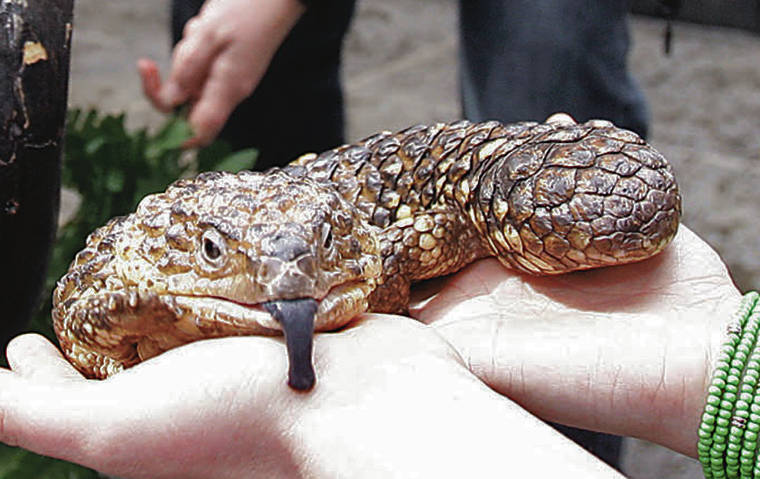Popular pet lizards smuggled into Japan

ASSOCIATED PRESS
The shingleback (or bobtail) lizard, a trendy pet in Japan, is indigenous to Australia. It is pricey, costing as much as 1 million yen (about $9,300). Japan is the fourth-largest importer of live reptiles globally.
JAKARTA >> The smuggling of bobtail lizards (also known as shingleback lizards), popular as pets in Asian countries, is rampant, and several Japanese citizens involved in the crime have been caught.
But since no law exists that restricts distribution once they are brought into Japan, the lizards are sold through pet shops and other conventional distribution channels.
The bobtail lizard is indigenous to Australia and has scales that look like pine cones. In recent years, it has become a pricey, sought-after pet in the country, sometimes sold for more than 1 million yen ($9,250).
Australian authorities are investigating smuggling cases alongside international organizations, suspecting that smuggling syndicates may be involved.
Australia restricts the export of its wild animals, yet the smuggling of bobtail lizards has been on the rise since 2018. In April and May, crackdowns by the International Criminal Police Organization along with investigations by 22 countries revealed more than 200 people involved in reptile smuggling.
Australian authorities have caught Japanese offenders in four cases since November. During the crackdowns, a Japanese woman was arrested for trying to take 19 lizards, including bobtail lizards, out of the country. In July, two Japanese men were sentenced to five months in prison for violating the Bio-diversity Conservation Law. They were spotted in early June attempting to transport 13 lizards in suitcases at Perth Airport, in the country’s southwest area.
Don't miss out on what's happening!
Stay in touch with breaking news, as it happens, conveniently in your email inbox. It's FREE!
Both cases involved live lizards. Officials speculate that a criminal organization is involved in the cases.
According to the World Wide Fund for Nature, more than 190,000 live reptiles are imported into Japan every year. These are worth some 430 million yen (more than $4 million).
Internationally, Japan is the fourth-largest importer of live reptiles, following Hong Kong, the United States and China.
Since Japan’s Welfare and Management of Animals Law does not require pet shops to prove their means of acquiring animals, it is believed that smuggled animals are distributed along side legally imported animals.



